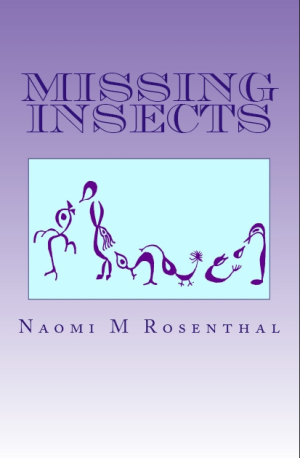Missing Insects
Rosenthal is an intriguing writer, committed to learning, and capturing, her own truth.
A collection of narrative vignettes, Missing Insects is Naomi Rosenthal’s memoir, spanning her early childhood to her own adulthood and eventual motherhood. Though intimate and uniquely personal in content, Rosenthal’s themes of family and the historic legacies haunting them reflect a universal truth, supported by her thoughtful and measured observations. Rosenthal writes from a place of understanding and appreciation of the histories that strained her relationship with her parents, which in part inspired her to strike out on her own at a young age and determine for herself what the world might offer.
Her journey is chronologically organized into five segments of varying lengths, each one further broken out into individually titled essays or chapters. Some segments feel rushed, as though Rosenthal is eager to move on to weightier material or arrive at a point in which she can pose her questions and consider possible answers. A final round of revision to remove excess pages in defense of those more precisely tied to her theme will enhance her already strong prose. Artistically inclined, Rosenthal illustrates her pieces with images reminiscent of cave paintings—simple, yet captivating.
The author encounters an abundant number of insects while living and traveling in Africa, an abundance she recognizes as absent from her American and European homes. This dichotomy of existence versus absence proves an effective metaphor throughout her memoir as she describes what was and was not present in her family, how existing dynamics were defined by those that were absent. The presence of insects is an environmental reality, just as the historic reality of the Holocaust defined the lives of her parents and that definition, in turn, shaped her environment growing up under their often-disapproving eyes.
The causal relationship between the Holocaust and Rosenthal’s family dynamics is hinted at but not stated until midway through the memoir. After her brother dies in a tragic accident, she wonders, “Maybe these things were a legacy of the Holocaust and its effects on our parents, especially our mother. I think subconsciously, we felt we had to make it up to our parents.”
Earlier identification and explication of survivor’s guilt, which is more fully explored at the conclusion, would help explain Rosenthal’s commitment to traveling, frequently alone and often through dangerous or war-torn countries. The motivation behind the author’s actions and decisions is sometimes difficult to tease out but surfaces by the end when she states, “I hope that these sad legacies, born of tragic historical events, which have haunted and crippled my family, have come to an end with me and spared my son from having them passed on to him.”
Rosenthal is an intriguing writer, committed to learning, and capturing, her own truth. Missing Insects introduces an engaging voice that calls attention to global, historical, and socioeconomic realities.
Reviewed by
Amanda Silva
Disclosure: This article is not an endorsement, but a review. The publisher of this book provided free copies of the book and paid a small fee to have their book reviewed by a professional reviewer. Foreword Reviews and Clarion Reviews make no guarantee that the publisher will receive a positive review. Foreword Magazine, Inc. is disclosing this in accordance with the Federal Trade Commission’s 16 CFR, Part 255.

